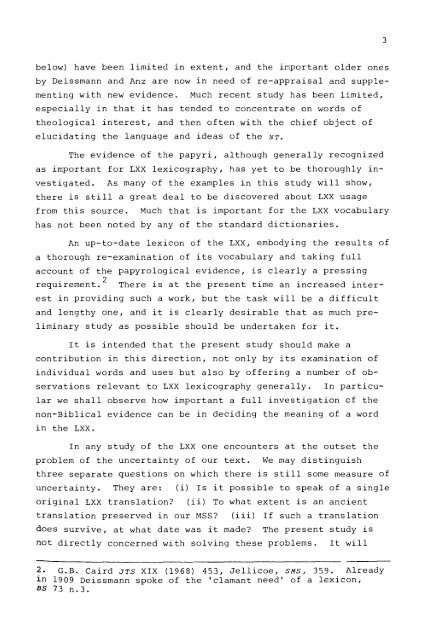A Lexical Study of the Septuagint Version of the Pentateuch
A Lexical Study of the Septuagint Version of the Pentateuch
A Lexical Study of the Septuagint Version of the Pentateuch
You also want an ePaper? Increase the reach of your titles
YUMPU automatically turns print PDFs into web optimized ePapers that Google loves.
elow) have been limited in extent, and <strong>the</strong> important older ones<br />
by Deissmann and Anz are now in need <strong>of</strong> re-appraisal and supple<br />
menting with new evidence. Much recent study has been limited,<br />
especially in that it has tended to concentrate on words <strong>of</strong><br />
<strong>the</strong>ological interest, and <strong>the</strong>n <strong>of</strong>ten with <strong>the</strong> chief object <strong>of</strong><br />
elucidating <strong>the</strong> language and ideas <strong>of</strong> <strong>the</strong> NT.<br />
The evidence <strong>of</strong> <strong>the</strong> papyri, although generally recognized<br />
as important for LXX lexicography, has yet to be thoroughly in<br />
vestigated. As many <strong>of</strong> <strong>the</strong> examples in this study will show,<br />
<strong>the</strong>re is still a great deal to be discovered about LXX usage<br />
from this source. Much that is important for <strong>the</strong> LXX vocabulary<br />
has not been noted by any <strong>of</strong> <strong>the</strong> standard dictionaries.<br />
An up-to-date lexicon <strong>of</strong> <strong>the</strong> LXX, embodying <strong>the</strong> results <strong>of</strong><br />
a thorough re-examination <strong>of</strong> its vocabulary and taking full<br />
account <strong>of</strong> <strong>the</strong> papyrological evidence, is clearly a pressing<br />
2<br />
requirement. There is at <strong>the</strong> present time an increased inter<br />
est in providing such a work, but <strong>the</strong> task will be a difficult<br />
and lengthy one, and it is clearly desirable that as much pre<br />
liminary study as possible should be undertaken for it.<br />
It is intended that <strong>the</strong> present study should make a<br />
contribution in this direction, not only by its examination <strong>of</strong><br />
individual words and uses but also by <strong>of</strong>fering a number <strong>of</strong> ob<br />
servations relevant to LXX lexicography generally. In particu<br />
lar we shall observe how important a full investigation <strong>of</strong> <strong>the</strong><br />
non-Biblical evidence can be in deciding <strong>the</strong> meaning <strong>of</strong> a word<br />
in <strong>the</strong> LXX.<br />
In any study <strong>of</strong> <strong>the</strong> LXX one encounters at <strong>the</strong> outset <strong>the</strong><br />
problem <strong>of</strong> <strong>the</strong> uncertainty <strong>of</strong> our text. We may distinguish<br />
three separate questions on which <strong>the</strong>re is still some measure <strong>of</strong><br />
uncertainty. They are: (i) Is it possible to speak <strong>of</strong> a single<br />
original LXX translation? (ii) To what extent is an ancient<br />
translation preserved in our MSS? (iii) If such a translation<br />
does survive, at what date was it made? The present study is<br />
not directly concerned with solving <strong>the</strong>se problems. It will<br />
2. G.B. Caird JTS XIX (1968) 453, Jellicoe, SMS, 359. Already<br />
in 1909 Deissmann spoke <strong>of</strong> <strong>the</strong> 'clamant need' <strong>of</strong> a lexicon,<br />
BS 73 η.3.

















